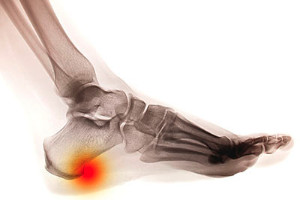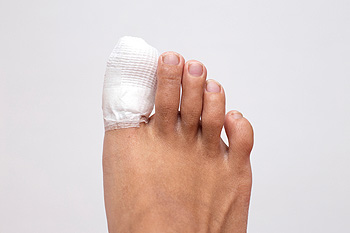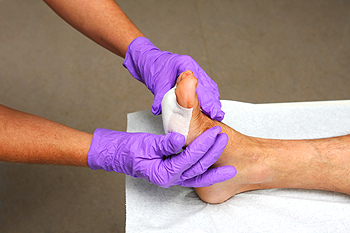

As a child grows into a young adult, their parents must take steps to ensure that they are doing all they can to protect the child’s feet. Children can be susceptible to a number of particular foot afflictions that can negatively impact their health. One foot condition that parents ought to be aware of is known as toe walking. Toe walking, also referred to as idiopathic toe walking, is a condition that occurs when a child continues to walk on their tiptoes beyond the age of 3. Although this might not sound like a problem to some, it should be noted that walking on one’s tiptoes for extended periods of time can lead to tight calves. Additionally, children who engage in toe walking might be restricting the extent to which their ankles can move freely. If your child engages in toe walking, contact a podiatrist today to schedule an appointment.
Making sure that your children maintain good foot health is very important as they grow. If you have any questions, contact Dr. Edward D. Hutson of Easton, PA. . Our doctor can provide the care you need to keep you pain-free and on your feet.
Keeping Children's Feet Healthy
Having healthy feet during childhood can help prevent medical problems later in life, namely in the back and legs. As children grow, their feet require different types of care. Here are some things to consider...
Although babies do not walk yet, it is still very important to take care of their feet.
Avoid putting tight shoes or socks on his or her feet.
Allow the baby to stretch and kick his or her feet to feel comfortable.
As a toddler, kids are now on the move and begin to develop differently. At this age, toddlers are getting a feel for walking, so don’t be alarmed if your toddler is unsteady or ‘walks funny’.
As your child gets older, it is important to teach them how to take care of their feet.
Show them proper hygiene to prevent infections such as fungus.
Be watchful for any pain or injury.
Have all injuries checked by a doctor as soon as possible.
Comfortable, protective shoes should always be worn, especially at play.
If you have any questions please feel free to contact our offices located in Easton, and Northampton, PA . We offer the newest diagnostic and treatment technologies for all your foot and ankle needs.

Stress and tension on the heels may result in a heel spur forming. It is defined as a small bony growth that forms on the bottom of the heel and is the body's natural defense against heel damage. The pain from a heel spur can be uncomfortable and can travel to the bottom of the foot where the plantar fascia lies. This is the band of tissue that connects the heel to the toes, and plantar fasciitis may gradually develop if inflammation occurs. A heel spur may be misdiagnosed as plantar fasciitis because it affects the heel. A proper evaluation is needed to differentiate between the two conditions, and this consists of having an X-ray taken. The heel spur is often noticeable in the X-ray and is done so the proper treatment can begin. Heel spurs can develop for various reasons, including wearing shoes that do not fit correctly, being overweight, or if the muscles in the back of the leg are tight. Mild relief may be found when comfortable shoes are worn, in addition to performing specific stretches that can ease heel pain. If you have a heel spur, please confer with a podiatrist as quickly as possible who can determine what the best treatment is for you.
Heel spurs can be incredibly painful and sometimes may make you unable to participate in physical activities. To get medical care for your heel spurs, contact Dr. Edward D. Hutson from Easton, PA. . Our doctor will do everything possible to treat your condition.
Heels Spurs
Heel spurs are formed by calcium deposits on the back of the foot where the heel is. This can also be caused by small fragments of bone breaking off one section of the foot, attaching onto the back of the foot. Heel spurs can also be bone growth on the back of the foot and may grow in the direction of the arch of the foot.
Older individuals usually suffer from heel spurs and pain sometimes intensifies with age. One of the main condition's spurs are related to is plantar fasciitis.
Pain
The pain associated with spurs is often because of weight placed on the feet. When someone is walking, their entire weight is concentrated on the feet. Bone spurs then have the tendency to affect other bones and tissues around the foot. As the pain continues, the feet will become tender and sensitive over time.
Treatments
There are many ways to treat heel spurs. If one is suffering from heel spurs in conjunction with pain, there are several methods for healing. Medication, surgery, and herbal care are some options.
If you have any questions feel free to contact our offices located in Easton, and Northampton, PA . We offer the latest in diagnostic and treatment technology to meet your needs.

Every pregnant woman knows that bringing a child to term can significantly affect one’s feet. For example, the feet may exhibit increased swelling or pain. Additionally, the woman’s feet may also have increased foot odor. Foot odor, also known as bromodosis, can affect pregnant women because a woman’s feet can increase in size, causing her shoes to fit tightly, which reduces the air flow to the feet. There are a number of things that a pregnant woman might consider doing to mitigate increased foot odor. For example, one might try wearing a kind of moisture-wicking sock. The point of this is to reduce the extent to which moisture accumulates on the feet, as this can also lead to odor. If you are planning on becoming pregnant, it might be a good idea to schedule an appointment with a podiatrist to ensure that you are doing everything you can to keep your feet in good shape.
Pregnant women with swollen feet can be treated with a variety of different methods that are readily available. For more information about other cures for swollen feet during pregnancy, consult with Dr. Edward D. Hutson from Easton, PA. . Our doctor will attend to all of your foot and ankle needs.
What Foot Problems Can Arise During Pregnancy?
One problem that can occur is overpronation, which occurs when the arch of the foot flattens and tends to roll inward. This can cause pain and discomfort in your heels while you’re walking or even just standing up, trying to support your baby.
Another problem is edema, or swelling in the extremities. This often affects the feet during pregnancy but tends to occur in the later stages.
How Can I Keep My Feet Healthy During Pregnancy?
If you have any questions please feel free to contact our offices located in Easton, and Northampton, PA . We offer the newest diagnostic and treatment technologies for all your foot and ankle needs.

Broken toes are common. They can happen to anyone at any time, from those who participate in sports to those whose toes get hit by a heavy object. Serious toe injuries typically happen to the big toe. Other toe breaks can be handled by taping the afflicted toe to the toe next to it to immobilize it. Whether serious or not, breaking a toe can be quite painful and make it difficult to walk. When a toe breaks, there will often be swelling, stiffness, and bruising. A serious fracture can cause the toe to look deformed. It takes approximately six weeks for a broken toe to heal. If healing is not progressing it might be due to incorrect use of crutches, the bone may have atrophied from non-use, or an infection is present. To avoid broken toes in the future, wear proper fitting protective shoes, use care when participating in sports, and include foods rich in vitamins C and D in your diet to strengthen bones. If you have broken your toe, it is a good idea to consult with a podiatrist who can determine the severity of the break and offer treatment options.
Broken toes may cause a lot of pain and should be treated as soon as possible. If you have any concerns about your feet, contact Dr. Edward D. Hutson from Easton, PA. . Our doctor will treat your foot and ankle needs.
What Is a Broken Toe?
A broken toe occurs when one or more of the toe bones of the foot are broken after an injury. Injuries such as stubbing your toe or dropping a heavy object on it may cause a toe fracture.
Symptoms of a Broken Toe
Although the injured toe should be monitored daily, it is especially important to have a podiatrist look at your toe if you have severe symptoms. Some of these symptoms include worsening or new pain that is not relieved with medication, sores, redness, or open wounds near the toe.
If you have any questions, please feel free to contact our offices located in Easton, and Northampton, PA . We offer the newest diagnostic and treatment technologies for all your foot care needs.

An individual may develop a number of different kinds of wounds on their feet over the course of their lifetime. Diabetics are particularly prone to developing this kind of foot affliction. Arterial ulcers are a specific kind of wound that one ought to be aware of. This kind of wound is characterized by its rounded shape. Often these wounds will have very clearly defined lines around the affected area. In terms of location on the feet, arterial ulcers are usually found on the tips of toes and on the heels. While an individual with arterial ulcers may not experience any bleeding at the base of the wound, it is important to note that the wounds themselves are usually extremely deep. If you have an arterial ulcer, schedule an appointment with a podiatrist as these wounds can be highly painful. This foot specialist can help you mitigate and treat the problem.
Wound care is an important part in dealing with diabetes. If you have diabetes and a foot wound or would like more information about wound care for diabetics, consult with Dr. Edward D. Hutson from Easton, PA. . Our doctor will assess your condition and provide you with quality foot and ankle treatment.
What Is Wound Care?
Wound care is the practice of taking proper care of a wound. This can range from the smallest to the largest of wounds. While everyone can benefit from proper wound care, it is much more important for diabetics. Diabetics often suffer from poor blood circulation which causes wounds to heal much slower than they would in a non-diabetic.
What Is the Importance of Wound Care?
While it may not seem apparent with small ulcers on the foot, for diabetics, any size ulcer can become infected. Diabetics often also suffer from neuropathy, or nerve loss. This means they might not even feel when they have an ulcer on their foot. If the wound becomes severely infected, amputation may be necessary. Therefore, it is of the upmost importance to properly care for any and all foot wounds.
How to Care for Wounds
The best way to care for foot wounds is to prevent them. For diabetics, this means daily inspections of the feet for any signs of abnormalities or ulcers. It is also recommended to see a podiatrist several times a year for a foot inspection. If you do have an ulcer, run the wound under water to clear dirt from the wound; then apply antibiotic ointment to the wound and cover with a bandage. Bandages should be changed daily and keeping pressure off the wound is smart. It is advised to see a podiatrist, who can keep an eye on it.
If you have any questions, please feel free to contact our offices located in Easton, and Northampton, PA . We offer the newest diagnostic and treatment technologies for all your foot care needs.